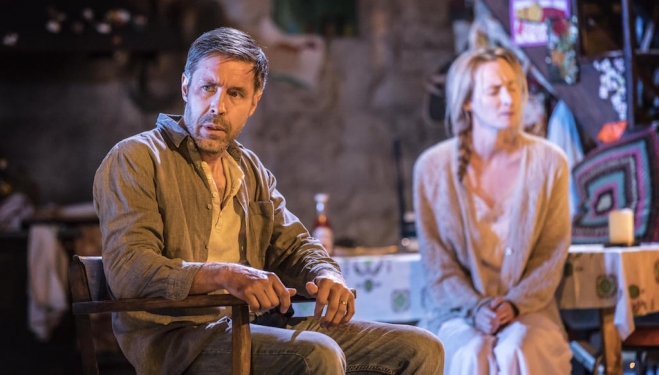Heather Nash explains why Jez Butterworth’s latest Irish drama is not one to be missed.
Jez Butterworth has been a playwright for more than 25 years, and yet he has only written a handful of plays independently in that time. So not a prolific playwright then, but you can forgive this shortfall when the writing he delivers is as good as The Ferryman.
The play opens on a dirty Derry street with a man in a foreboding trench coat and some questions about a body which was found face-down in a bog some miles out in the countryside. Local priest Father Horrigan is asked to do the good catholic thing and inform the family, whose confessions he’s been listening to for the past ten years since Sam Carney first went missing. Sam’s brother Quinn (Paddy Considine in an outstanding controlled, yet charismatic stage debut) used to have a bit of a reputation around town, but the play’s opening finds him dancing around the farmhouse kitchen in the early hours with a woman we assume is his wife, Caitlin Carney (a devastating Laura Donnelley.) Oh, how that assumption will haunt us.

Rob Howell’s intricate stage design adds subtle layers to what at first appears to be a piece of domestic drama – the sloping staircase is the hub of the family home but the curtained exits are rife with eavesdropping ears. Sam Mendes’ tight direction, fresh off the big screen from Bond’s Skyfall, must be credited at keeping this epic tale together – 20 plus cast members including a live goose, a baby and countless kids on rotation mean big, carefully choreographed ensemble scenes.
But the play is decidedly not family friendly; the IRA’s politics crawl between every line spoken on stage. Bobby Sands is a few weeks in the grave and Irish nationalism is taking hold of the young men around the Carney farm. Some of the play’s best acting is found in young Guildhall graduate Tom Glynn-Carney as farm-hand Shane, who believes he will be instrumental to the IRA’s promised success. Carney’s conviction means it’s a hard scene to stomach – young men are universally quick to radicalise, desperate to prove themselves in some way – this has not changed.

The play’s denouement comes swiftly even after a 3 hour run time and when the curtain fell I was quite literally hovering out of my seat and holding my breath. As I thought about the play afterwards it’s a credit to Butterworth that his characters, so stereotypically Irish, and the play’s trajectory, so similar to those favoured by classic playwrights like Tennessee Williams, never feels too much when they could quite easily be tipped over into a pastiche by a less controlled hand.
This is a story that will take root, playwriting at a perfect pitch. Tickets are now notoriously hard to get a hold of, so I hope to goodness that it either goes on tour or is picked up for some sort of adaptation, but do see it if you possibly can.
Heather Nash
(All images courtesy of Johan Persson)

